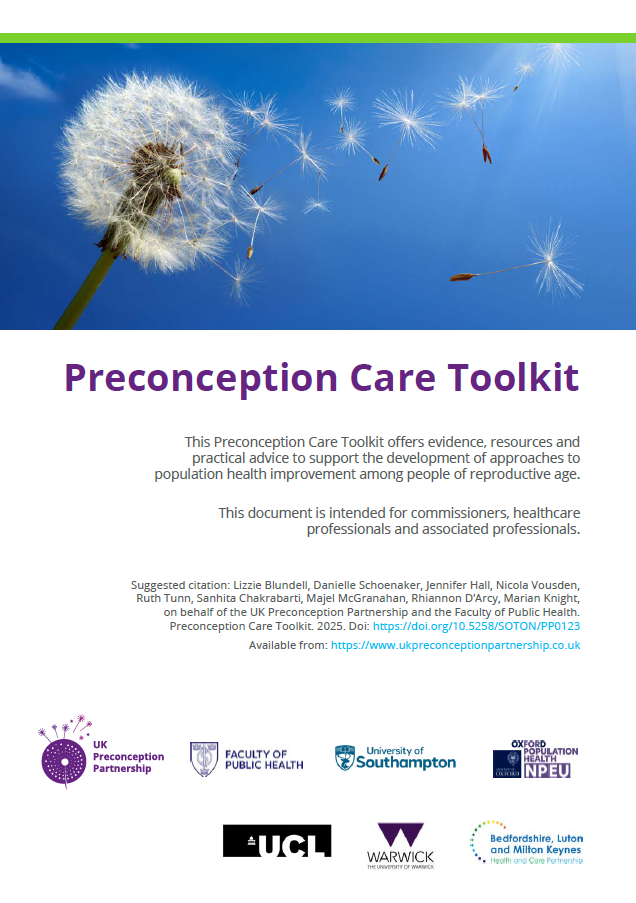10th October 2025
We are delighted to publish this Voices blog by Dr Danielle Schoenaker, Senior Research Fellow at the University of Southampton, who shares the latest updates of the Preconception Care Toolkit.

Dr Danielle Schoenaker, Senior Research Fellow, University of Southampton
Health visitors have a unique role in supporting families – not only by promoting children’s health and development, but also by offering practical and emotional support to parents. This is particularly important for families facing greater challenges and vulnerabilities.
Through their trusted relationships and regular engagement in the early years, health visitors are well placed to have conversations with families about their plans. This might include exploring whether they feel their family is complete, or whether they would like support with avoiding or preparing for another pregnancy.
Why Interpregnancy Care Matters
The postnatal period is a key window for promoting health and wellbeing. While new parents often juggle many demands, support for their physical health and emotional wellbeing can make a lasting difference.
- In the short term, it helps parents feel healthier, more confident, and better able to care for their family.
- In the longer term, it reduces their risk of non-communicable diseases.
- Contraception advice can help prevent unplanned pregnancies and support healthy spacing between pregnancies, which is recommended to be 2 years.
- Interpregnancy support helps families to prepare for a future pregnancy, laying the foundations for parents and their children to have healthy starts and futures.
Preconception Care Toolkit
There is growing recognition among community-based health hubs and services of the importance of preconception and interpregnancy support. However, many health professionals and commissioners highlight a need for practical resources, guidance, and examples of good practice.
The Preconception Care Toolkit was developed to meet this need. It brings together the latest evidence in an accessible format, alongside case studies showing how different approaches can work in practice.
The Toolkit includes three main sections:
- How can data help?
Health data before and between pregnancies provides valuable insights into how well prepared people are for pregnancy, and where more support is needed. For example, national data show that the proportion of women taking folic acid supplements before pregnancy has decreased over the past five years, and uptake before a subsequent pregnancy is lower than before a first pregnancy. Health visitors can play a key role in addressing these gaps by sharing timely advice and linking families to wider services where needed.
- Key guidance and evidence documents
The Toolkit connects people with a wide range of helpful resources for both the public and professionals, including:- – For the public: Tommy’s Pregnancy Planning Tool, and the Thinking of Having a Baby leaflet.
- – For health professionals: NHSE’s Preconception Care e-learning (e-LfH Hub), and guidance on delivering preconception care to women with a serious mental illness.
- – Research findings: Practical insights into when and how to ask about pregnancy intentions, and the importance of using accessible and inclusive language such as “health and wellbeing before pregnancy and parenthood” rather than more technical terms like “preconception” or “interpregnancy” health.
- Case studies
The Toolkit also highlights local examples of preconception care in action, including:
- The #ReadyforPregnancy campaign, developed by NHS South East Clinical Network and NHS Creative. Resources are available in multiple languages to support parents to think about important factors when planning another baby.
- System-based approaches, such as the preconception care programme in NHS Bedfordshire, Luton & Milton Keynes. This initiative combined public-facing materials, community champions, clinical templates, health professional training and specialist preconception clinics. The programme improved early access to maternity care, particularly for high-risk women such as those with pre-existing diabetes.
Supporting Families: What You Can Do
The Toolkit is designed to help health visitors and other professionals integrate preconception and interpregnancy care into everyday practice. I would like to encourage you to explore the Toolkit, reflect on actions you can take locally, and consider how best to support the families you work with.
We also welcome feedback on how future versions of the Toolkit can be improved, including new examples of good practice. This work will continue as part of the Preconception and Interpregnancy Health theme within the NIHR Maternity Disparities Consortium.
Dr Danielle Schoenaker, Senior Research Fellow, University of Southampton
Email: [email protected]
Further resources
Preconception Care Toolkit: https://www.ukpreconceptionpartnership.co.uk/resources/preconception-care-toolkit
UK Preconception Partnership: https://www.ukpreconceptionpartnership.co.uk/
NIHR Maternity Disparities Consortium: https://www.nihr.ac.uk/nihr-challenge-maternity-disparities-consortium
iHV Postnatal Contraception Training
The iHV has developed a training programme on Postnatal Contraception which is focused on the interpregnancy period. The first programme will be held on 10 February 2026 09:30-13:30 – to book your place please contact [email protected]
Launch webinar: Preconception Care Toolkit
- Date & time: Tuesday 21 October 2025 from 12:00–13:00
- Teams meeting link: Join the meeting now
- Meeting ID: 354 472 880 037 3
Passcode: bm6sb7Nh
No need to register.
The UK Preconception Partnership and Faculty of Public Health Special Interest Group on Health of Women and Girls have published a Preconception Care Toolkit.
The Toolkit brings together key evidence, case studies and resources on preconception care for professionals responsible for commissioning health or health improvement services in England. This includes teams within Integrated Care Boards (ICBs), Local Authorities and healthcare providers. Many elements of the Toolkit are also broadly applicable across Scotland, Wales and Northern Ireland.
During the webinar you will learn how the Toolkit might be used, hear about case studies and resources available for (local) preconception care programmes, and discuss next steps. There will also be time for questions.






